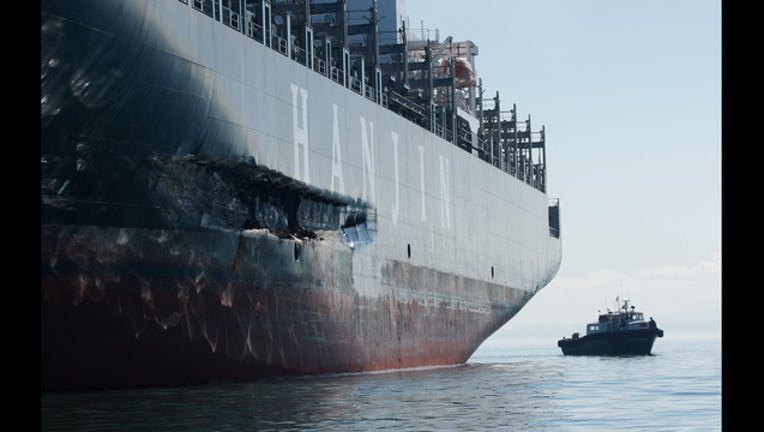10th anniversary of Cosco Busan oil spill 'a cautionary tale'

A 90 foot gash is seen in the side of the freighter ship Cosco Busan as it sits anchored in the San Francisco Bay November 13, 2007 in San Francisco, California. (Photo by Justin Sullivan/Getty Images)
OAKLAND, Calif. (BCN) - On the tenth anniversary of the disastrous Cosco Busan oil spill in the San Francisco Bay, Audubon California is calling the event "a cautionary tale" as the Trump administration explores expanding oil drilling.
The container ship Cosco Busan crashed into a Bay Bridge support tower Nov. 7, 2007, sending more than 53,000 gallons of bunker fuel - heavy fuel oil - spewing into the bay.
The spill affected people, estuarine and marine wildlife, habitats and recreation across several counties.
"If there's anything we learned ten years ago in the San Francisco Bay, it's that one small mistake can quickly kill a lot of birds and destroy places we care about deeply," Andrea Jones, Audubon California's director of bird conservation, said in a statement.
"Almost immediately following the spill, there were reports of dead and dying birds in the bay," Jones said.
Under the direction of the Trump administration, the Commerce Department just completed a report outlining potential changes to allow oil drilling within national marine sanctuaries, the Audubon Society said.
These include the Greater Farallones National Marine Sanctuary near the Golden Gate Bridge, according to the society.
Officials with the Department of the Interior are currently studying removing restrictions on new offshore drilling on the outer continental shelf, the Audubon Society said.
The disastrous spill in 2007 led to improvements in regional spill response, according to the California Department of Fish and Wildlife. Coordination between local, state and federal responders has improved, the department said.
Local government has been incorporated into the unified command structure that manages response to oil spills in California. Before that, only the U.S. Coast Guard, the Department of Fish and wildlife and the responsible parties were involved, fish and wildlife officials said.
This way, cities and counties can help out more easily during an incident.
Spill prevention staff members have been added to ports in San Francisco and Los Angeles/Long Beach to make operations safer when ships are taking on and off-loading oil, according to fish and wildlife officials.

